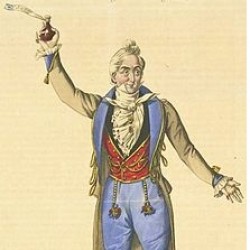
L'elisir d'amore in Scotland
Posted 28 Aug 2016
The first performance in Scotland of Donizetti's Elixir of Love was on 11 May 1838, in Edinburgh's Theatre Royal.
This performance, by Mr Mitchell's Italian Opera Buffa Company on tour from London, took place only six years after its Milan premiere. Nemorino was sung by Signor Catone, who had taken the role in the London premiere less than two years earlier. The other principals were Mademoiselle Scheroni, Signor Bellini and, as Dulcamara, Frederick Lablache, son of the famous bass Luigi Lablache, who had settled in Britain. The critic of the Caledonian Mercury said 'The music by Donizetti has some very clever points, though these are few and far between'. One of these was, fortunately, 'Una furtiva lagrima', due to Catone's 'eminently beautiful' rendering, which was encored.
In 1893, the Carl Rosa Opera played it in a shortened form under the title Adina, in both Glasgow and Edinburgh. The reason for this was that it was being tried as a makeweight for the outrageously successful Cavalleria Rusticana. Pagliacci had not yet arrived on the scene. The experiment was not repeated.
It was after the Second World War that Elixir of Love began to achieve the recognition it now enjoys.
The fifties saw two stagings imported from Italy. The first, a touring company that spent several weeks going round Britain in the autumn of 1954, visited Edinburgh, Glasgow and Aberdeen. A leading soprano of the period, Margherita Carosio, who appeared regularly at La Scala, sang Adina.
The second visit may be said to have really put the opera on the map. The 1957 Edinburgh Festival was dominated by the first visit to Scotland of the renowned La Scala, Milan company. L'elisir d'amore was directed by Franco Enriquez and conducted by Nino Sanzogno. While Maria Callas was not singing Adina (she was busy with Bellini's Sonnambula), the cast was led by the brilliant young tenor Giuseppe di Stefano. His performance of 'Una furtiva lagrima' was reported to have been followed by a ten-minute ovation. Other members of this consistently excellent team were Rosanna Carteri and Giulio Fioravanti, with the brilliant comic bass Fernando Corena as Dulcamara.
Scottish Opera's first full-scale production, by Graham Vick in designs by Russell Craig, played in 1984. Bill McCue was in his comic element as Dulcamara, with Ryland Davies a touching Nemorino. Two notable American singers were in the line-up, soprano Ashley Putnam as Adina and Brent Ellis as Belcore. A real scene-stealer proved to be Dulcamara's chosen transport - a classic car in the form of a little Fiat 'Topolino'. The conductor was a young Scot, Ian Robertson, who was the company's chorus master and later spent most of his career in the same role at San Francisco Opera.
The second Scottish Opera staging opened in 1994. The director, making a rare appearance with the company, was Giles Havergal from the Citizens' Theatre, and the more traditional designs were, once more, by Russell Craig. The long run included Cheryl Barker and Claire Daniels (Adina), Paul Charles Clarke and Richard Coxon (Nemorino), Simon Keenlyside and Richard Halton (Belcore) with Claude Corbeil and Stafford Dean as Dulcamara. The two conductors were Marco Guidarini and Stephen Clarke.
That excellent staging had a memorable revival in 2000, conducted by Richard Farnes. The strong cast had Lisa Milne (who had sung Giannetta back in 1994) moving up to Adina. Donato di Stefano was a memorably seedy Dulcamara, with Barry Banks and Simon Thorpe as Nemorino and Belcore. The equally successful run in 2009 was led by the company's musical director Francesco Corti and featured Edgaras Montvidas as a gawky and endearing Nemorino. Elena Xanthoudakis sang Adina, with Marcin Bronikowski as Belcore and Francesco Facini Dulcamara.
Our illustration is of the first Dulcamara, Giuseppe Frezzolini, in the role.
Archive
2025
December
2024
November
March
2023
November
March
January
2022
August
July
2019
October
2018
September
February
2017
November
2016
November
October
September
May
March
February
2015
December
October
September
March
2014
October
March
2013
November
February
2011
December
November
September
August
June